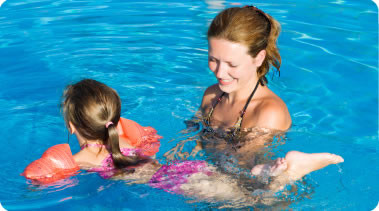Swimming involves numerous techniques, strategies and practices. Different individuals think and feel differently about swimming. Consequently, the concepts, notions and ideas regarding swimming vary greatly. If you have been learning and practicing swimming for quite some time now, you must have come across contradictory opinions and judgments about both swimming and swimmers. Now, while it is perfectly OK to hold opinions, it is in no way, desirable for a swimmer to believe in any of the myths surrounding swimming. Since most people commit the mistake of drawing conclusions depending on their personal experiences, the myths that make their rounds are in plenty. As a swimmer, you should know only what is right and then decide, depending on suitability. So, here’s busting some of the common myths about swimming for you to have clear knowledge about this amazing sport.
Eating Within Two Hours of Swimming Leads to Cramping
This is a very commonly held misconception that most swimmers believe in and follow rather strictly. You must have seen swimmers around you not eating anything long before the start of a swim session. This is particularly followed during races and competitions. On the contrary, keeping your stomach empty for as long as two-three hours is never recommended by experts, especially for swimmers who have a very low percentage of body fat. Of course, you are not supposed to eat anything too heavy or fatty as that has chances of making you feel uncomfortable in the waters. But an energy bar can work wonders in letting you develop a solid block of energy that eventually gets released allowing you to have a prolonged session with high intensity.
Pulling with the Paddles Helps You Become a Better Swimmer
Paddles help in pulling quicker but experts imparting you with the Omaha swimming lessons will always discourage you to use these tools. Paddles can actually turn out to be dangerous for the inexperienced and technically challenged swimmers. Using paddles create an increased surface area, putting unnecessary pressure on your shoulders and making them prone to pain and injuries.
Proper pulling is initiated when there is a preload on the latissimus muscles and that should be done without the paddles. Swimmers using paddles end up exerting too much pressure on their rotator cuff muscles as well as the triceps. Another disadvantage of practicing with the paddles is that when you stop using them, you are most likely to swing off right at the back of the set. So, the lesser you use paddles, the better you are as a swimmer. Consult your expert and learn about alternative stroke styles and techniques in order to improve your ability of pulling in the waters.
Kicking Does Not Help in Forward Propulsion
This is perhaps the greatest misconception about swimming techniques that have become popular. The importance of kicks often remains unrecognized by the swimmers. The reality is just the opposite. Legs help in propelling ahead just as much as the arms do. In fact, swimming experts with years of coaching are of the opinion that the faster you kick, the faster you are in the waters.
Swimming is Not Meant for the Too Small Kids
With the number of parents enrolling their kids for swimming lessons increasing these days, many people are still apprehensive of how the waters will treat their little ones. The fact is that swimming can be taught to not just the young kids but also infants and babies because they actually have a natural inclination to swim. So, when taught with guidance and in the right manner, they will learn faster and have chances of growing up to be great swimmers in the long run. These days, you have swimming schools offering programs that allow parents and kids to learn swimming together. Such an environment will be conducive for both you and your kid, helping you get rid of all worries about the safety of your child.
Apart from the ones mentioned above, there might be other myths as well. Always make it a point to talk to a professional with considerable experience of swimming before developing an opinion of your own, based on false concepts and wrong information that are too many out there.






